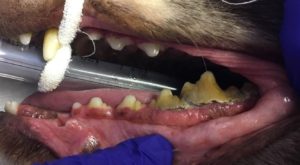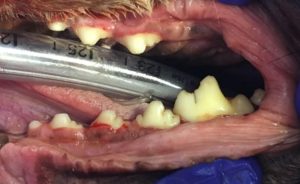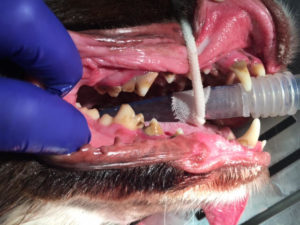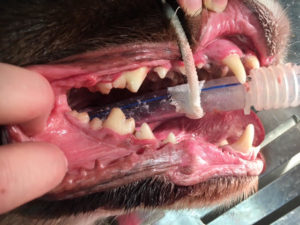Dental Disease Part 3-Dental Surgery
Even with good preventative dental care some animals will still require a dental procedure. Some may even need multiple dental surgeries throughout their lifetime.
Due to the nature of dental disease developing over an animal’s lifetimes it is often our geriatric patients that require dental surgery. However, a dental requires a full general anaesthetic and often people worry their pets are ‘too old to put through an anaesthetic’. We completely understand this concern and examine each patient thoroughly to ensure there are no issues which may increase the anaesthetic risk. We find in a huge number of dental cases that the resolution of dental pain and the improved quality of life after the dental surgery hugely outweigh the concern for the anaesthetic.
So what happens during the dental?
At the beginning of the dental we remove thick tartar from your pets teeth with specialised instruments and a descaling machine. This allows us to assess the integrity of the tooth underneath. If the tooth underneath is healthy and stable we ensure it is cleaned thoroughly and polished. We never remove healthy stable teeth from your pets mouth, it is unnecessary and in fact very hard work!
The reasons we would extract a tooth include:
- Root exposure and decay
- Severe gingivitis and pocketing around the tooth
- Wobbly unstable teeth
- Teeth associated with tooth root infections
- Fractured or damaged teeth which are painful
Before and after pictures
Post dental care
During the dental your pet will have had a strong pain relief and an anti-inflammatory, we continue these anti-inflammatories at home for a few days too and following extractions your pet will require a course of antibiotics. Your pet may be a little quiet that evening following their anaesthetic but after that they can be treated as normal. Most pets will eat well that evening and if not by the following day. Cats and dogs cope remarkably well with little to no teeth, some will still even manage dry food! 5 days post dental we will check that your pets mouth is healing well and ongoing preventative dental care is encouraged.




